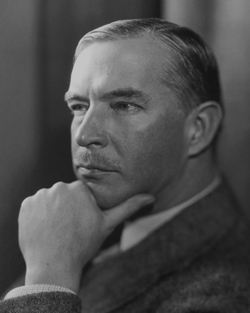The Late George Apley
Book Details
| Title: | The Late George Apley | ||||||||||
| Author: |
| ||||||||||
| Published: | 1936 | ||||||||||
| Publisher: | The Modern Library | ||||||||||
| Tags: | fiction, satire, Pulitzer Prize, film/TV adaptation | ||||||||||
| Description: | Sweeping us into the inner sanctum of Boston society, into the Beacon Hill town houses and exclusive private clubs where only the city's wealthiest and most powerful congregate, this novel gives us—through the story of one family and its patriarch, the recently deceased George Apley—the portrait of an entire society in transition. Gently satirical and rich with drama, the novel moves from the Gilded Age to the Great Depression as it projects George Apley's world—and subtly reveals a life in which status and accomplishment mask disappointment and regret, a life of extreme and enviable privilege that is nonetheless an imperfect life.--Goodreads.com. [Suggest a different description.] |
||||||||||
| Downloads: | 796 | ||||||||||
| Pages: | 311  |
Author Bio for Marquand, John P. (John Phillips)

John Phillips Marquand (November 10, 1893 – July 16, 1960) was an American writer. Originally best known for his Mr. Moto spy stories, he achieved popular success and critical respect for his satirical novels, winning a Pulitzer Prize for The Late George Apley in 1938. One of his abiding themes was the confining nature of life in America's upper class and among those who aspired to join it. Marquand treated those whose lives were bound by these unwritten codes with a characteristic mix of respect and satire.
By the mid-1930s he was a prolific and successful writer of fiction for slick magazines like the Saturday Evening Post. Some of these short stories were of an historical nature as had been Marquand's first two novels (The Unspeakable Gentleman and The Black Cargo). These would later be characterized by Marquand as “costume fiction”, of which he stated that an author “can only approximate (his characters) provided he has been steeped in the (relevant) tradition”. Marquand had abandoned “costume fiction” by the mid-1930s.
In the late-1930s, Marquand began producing a series of novels on the dilemmas of class, most centered on New England. The first of these, The Late George Apley (1937), a satire of Boston's upper class, won the Pulitzer Prize for the Novel in 1938. Other Marquand novels exploring New England and class themes include Wickford Point (1939), H.M. Pulham, Esquire (1941), and Point of No Return (1949). The last is especially notable for its satirical portrayal of Harvard anthropologist W. Lloyd Warner, whose Yankee City study attempted (and in Marquand's view, dismally failed) to describe and analyze the manners and mores of Marquand's Newburyport.--Wikipedia.
Available Formats
| FILE TYPE | LINK | ||
| UTF-8 text | 20220269.txt | ||
| HTML | 20220269.html | ||
| Epub | 20220269.epub | If you cannot open a .mobi file on your mobile device, please use .epub with an appropriate eReader. | |
| Mobi/Kindle | 20220269.mobi | ![1. Download the .mobi file into your computer’s Downloads Folder.
2. Rename the file from [8-digit number].mobi to [my title].mobi.
3. Connect your Kindle to your computer using the Kindle USB cable.
4. Open the “documents” folder in the Kindle directory and Copy/Paste
the renamed .mobi file into the “documents” folder.
5. Eject your Kindle. The file will then appear in the Kindle Main Menu
as a New item with the new renamed file name. Info](/images/info.jpg) | Not all Kindles or Kindle apps open all .mobi files. |
| PDF (tablet) | 20220269-a5.pdf | ||
| HTML Zip | 20220269-h.zip |
Kindle Direct (New, Experimental)
Send this book direct to your kindle via email. We need your Send-to-Kindle Email address, which can be found by looking in your Kindle device’s Settings page. All kindle email addresses will end in @kindle.com. Note you must add our email server’s address, [email protected], to your Amazon account’s Approved E-mail list. This list may be found on your Amazon account: Your Account→ Manage Your Content and Devices→ Preferences→ Personal Document Settings→ Approved Personal Document E-mail List→ Add a new approved e-mail address.
This book is in the public domain in Canada, and is made available to you DRM-free. You may do whatever you like with this book, but mostly we hope you will read it.
Here at FadedPage and our companion site Distributed Proofreaders Canada, we pride ourselves on producing the best ebooks you can find. Please tell us about any errors you have found in this book, or in the information on this page about this book.
